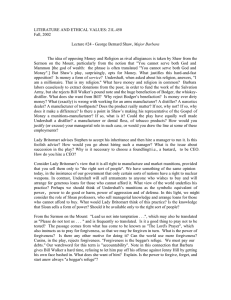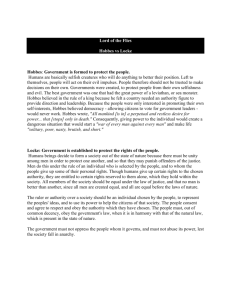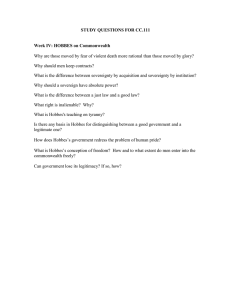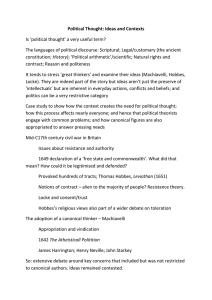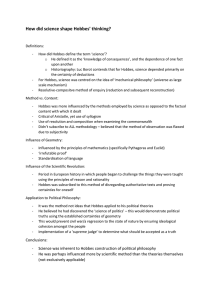LECTURE FIVE Materials to Guide Reading
advertisement
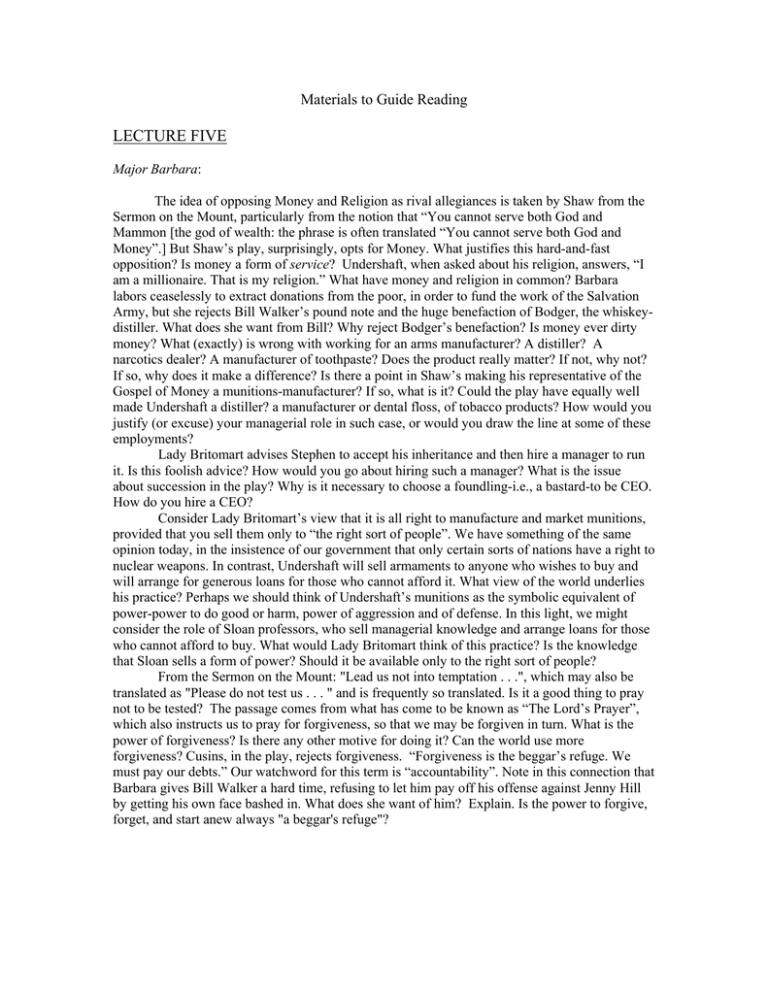
Materials to Guide Reading LECTURE FIVE Major Barbara: The idea of opposing Money and Religion as rival allegiances is taken by Shaw from the Sermon on the Mount, particularly from the notion that “You cannot serve both God and Mammon [the god of wealth: the phrase is often translated “You cannot serve both God and Money”.] But Shaw’s play, surprisingly, opts for Money. What justifies this hard-and-fast opposition? Is money a form of service? Undershaft, when asked about his religion, answers, “I am a millionaire. That is my religion.” What have money and religion in common? Barbara labors ceaselessly to extract donations from the poor, in order to fund the work of the Salvation Army, but she rejects Bill Walker’s pound note and the huge benefaction of Bodger, the whiskeydistiller. What does she want from Bill? Why reject Bodger’s benefaction? Is money ever dirty money? What (exactly) is wrong with working for an arms manufacturer? A distiller? A narcotics dealer? A manufacturer of toothpaste? Does the product really matter? If not, why not? If so, why does it make a difference? Is there a point in Shaw’s making his representative of the Gospel of Money a munitions-manufacturer? If so, what is it? Could the play have equally well made Undershaft a distiller? a manufacturer or dental floss, of tobacco products? How would you justify (or excuse) your managerial role in such case, or would you draw the line at some of these employments? Lady Britomart advises Stephen to accept his inheritance and then hire a manager to run it. Is this foolish advice? How would you go about hiring such a manager? What is the issue about succession in the play? Why is it necessary to choose a foundling-i.e., a bastard-to be CEO. How do you hire a CEO? Consider Lady Britomart’s view that it is all right to manufacture and market munitions, provided that you sell them only to “the right sort of people”. We have something of the same opinion today, in the insistence of our government that only certain sorts of nations have a right to nuclear weapons. In contrast, Undershaft will sell armaments to anyone who wishes to buy and will arrange for generous loans for those who cannot afford it. What view of the world underlies his practice? Perhaps we should think of Undershaft’s munitions as the symbolic equivalent of power-power to do good or harm, power of aggression and of defense. In this light, we might consider the role of Sloan professors, who sell managerial knowledge and arrange loans for those who cannot afford to buy. What would Lady Britomart think of this practice? Is the knowledge that Sloan sells a form of power? Should it be available only to the right sort of people? From the Sermon on the Mount: "Lead us not into temptation . . .", which may also be translated as "Please do not test us . . . " and is frequently so translated. Is it a good thing to pray not to be tested? The passage comes from what has come to be known as “The Lord’s Prayer”, which also instructs us to pray for forgiveness, so that we may be forgiven in turn. What is the power of forgiveness? Is there any other motive for doing it? Can the world use more forgiveness? Cusins, in the play, rejects forgiveness. “Forgiveness is the beggar’s refuge. We must pay our debts.” Our watchword for this term is “accountability”. Note in this connection that Barbara gives Bill Walker a hard time, refusing to let him pay off his offense against Jenny Hill by getting his own face bashed in. What does she want of him? Explain. Is the power to forgive, forget, and start anew always "a beggar's refuge"? Hobbes: Hobbes put certain ideas at the forefront of attention in ethical philosophy. He was not the first to entertain these ideas, but he was the first to express them as elements in a systematic view of the world. As a result, even though some of his contemporaries and successors thought them disreputable, nevertheless it became increasingly difficult to think of them as unworthy of important consideration. The basic idea was to take a materialistic view of human nature. In this view, each human being is an array of appetites and aversions, continuously stimulated into existence by sensory events, and continually changing in character, so that there is no overall aim for human action over the course of a lifetime - no such thing as a summum bonum or “highest good”, no condition of being that mankind tries to achieve in order to suit its nature. The value of anything is determined just by what we happen to want at one moment or another, and the idea of a permanent goal or an enduring satisfaction is just an illusion. Appetites and aversions, moreover, are not simple qualities but composites. At any given moment, they are the overall resolution of innumerable differing responses to stimuli, in which so much of each response is traded off against so much of every other to produce the collective result - an impulse to motion. The feature of Hobbes’s thinking that most concerns us here is that appetite and aversion must be understood as changing vectors, temporary compromises between differences in the strength and direction of initial responses to stimuli. Since value in human life is determined by the relative strength of appetites and aversion, and these are the composite vectors of multiple forces, it follows that every value is the result of a trade-off between measurable quantities. The value of any resulting composite, however desirable at any given moment to some human beings and undesirable to others, is nonetheless representable in principle as equivalent in value to some quantity of any other. Appetite and aversion are, so to speak, the universal currency of mankind. Although Hobbes lived before the advent of a fully-fledged market economy, he captured here the notion that underlies it-namely, that the value of any one thing can measured in terms of the value of any other, provided they are either things to be acquired or avoided. Some things may be very dear and others cheap, but all have a price-a value in terms of each other. Bill Walker would approve of Hobbes, could he have read him. “I don’t want Jenny Hill’s forgiveness. What I done, I’ll pay for.” It is all very well to put a value upon apples in terms of oranges, or of goods in terms of services, or even of a surgically-transplanted kidney (and therefore of a human life) in terms of so many television sets, but what about our more fundamental human obligations? Our obligation to our parents, for instance: they want more than you care to give, you want more than they care to give. But according to Hobbes, all these “wants” are themselves the result of trade-offs among impulses, not independent sources of value, and so the working result, in free market conditions, is due measure. Parents and children can settle up between themselves, each “buying out” the obligation to the other, which can be determined by bargaining, as in a divorce settlement. Hobbes, of course, doesn’t go this far, but the notion of buy-out is implicit in his argument. We have earlier discussed (in considering the Antigone) an uncompromising doctor and two uncompromising Christian-Science parents. Is it the case that when we deal with balking at compromise, we are dealing with ignorance or bad thinking?
